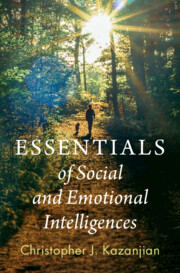Refine search
Actions for selected content:
245 results
Electroceutical enhancement of self-compassion training using transcutaneous vagus nerve stimulation: results from a preregistered fully factorial randomized controlled trial
-
- Journal:
- Psychological Medicine / Volume 55 / 2025
- Published online by Cambridge University Press:
- 04 August 2025, e223
-
- Article
-
- You have access
- Open access
- HTML
- Export citation
Chapter 13 - Building Compassionate Health Systems
- from Part II - Practising Compassion
-
- Book:
- Handbook of Compassion in Healthcare
- Published online:
- 27 June 2025
- Print publication:
- 17 July 2025, pp 106-113
-
- Chapter
-
- You have access
- Open access
- HTML
- Export citation
Chapter 7 - Resilience and Compassion
- from Part I - Compassion in Healthcare
-
- Book:
- Handbook of Compassion in Healthcare
- Published online:
- 27 June 2025
- Print publication:
- 17 July 2025, pp 60-67
-
- Chapter
-
- You have access
- Open access
- HTML
- Export citation
Chapter 10 - Cultivating Mindfulness and Awareness
- from Part II - Practising Compassion
-
- Book:
- Handbook of Compassion in Healthcare
- Published online:
- 27 June 2025
- Print publication:
- 17 July 2025, pp 83-89
-
- Chapter
-
- You have access
- Open access
- HTML
- Export citation
Conclusions
- from Part II - Practising Compassion
-
- Book:
- Handbook of Compassion in Healthcare
- Published online:
- 27 June 2025
- Print publication:
- 17 July 2025, pp 114-116
-
- Chapter
-
- You have access
- Open access
- HTML
- Export citation
Chapter 8 - Self-Compassion
- from Part I - Compassion in Healthcare
-
- Book:
- Handbook of Compassion in Healthcare
- Published online:
- 27 June 2025
- Print publication:
- 17 July 2025, pp 68-74
-
- Chapter
-
- You have access
- Open access
- HTML
- Export citation
Chapter 12 - Developing Resilience
- from Part II - Practising Compassion
-
- Book:
- Handbook of Compassion in Healthcare
- Published online:
- 27 June 2025
- Print publication:
- 17 July 2025, pp 98-105
-
- Chapter
-
- You have access
- Open access
- HTML
- Export citation
Chapter 11 - Deepening Compassion
- from Part II - Practising Compassion
-
- Book:
- Handbook of Compassion in Healthcare
- Published online:
- 27 June 2025
- Print publication:
- 17 July 2025, pp 90-97
-
- Chapter
-
- You have access
- Open access
- HTML
- Export citation

Handbook of Compassion in Healthcare
- A Practical Approach
-
- Published online:
- 27 June 2025
- Print publication:
- 17 July 2025
-
- Book
-
- You have access
- Open access
- Export citation
The Role of Mindfulness in Reducing Depression During COVID-19 At-home Treatment
-
- Journal:
- Disaster Medicine and Public Health Preparedness / Volume 19 / 2025
- Published online by Cambridge University Press:
- 16 April 2025, e97
-
- Article
- Export citation
Chapter 5 - Mindful Self-Awareness
-
- Book:
- Essentials of Social and Emotional Intelligences
- Published online:
- 25 March 2025
- Print publication:
- 27 March 2025, pp 104-134
-
- Chapter
- Export citation

Essentials of Social and Emotional Intelligences
-
- Published online:
- 25 March 2025
- Print publication:
- 27 March 2025
Resilient living program for patients with advanced cancer and their caregivers
-
- Journal:
- Palliative & Supportive Care / Volume 23 / 2025
- Published online by Cambridge University Press:
- 14 March 2025, e75
-
- Article
-
- You have access
- Open access
- HTML
- Export citation
Mindfulness-based cognitive therapy for depression after traumatic brain injury: responders’ characteristics
-
- Journal:
- The Cognitive Behaviour Therapist / Volume 18 / 2025
- Published online by Cambridge University Press:
- 11 February 2025, e7
-
- Article
-
- You have access
- Open access
- HTML
- Export citation
6 - Mindfulness and Enjoying the Moment
-
- Book:
- Brain Boost
- Published online:
- 23 January 2025
- Print publication:
- 23 January 2025, pp 68-77
-
- Chapter
-
- You have access
- HTML
- Export citation
8 - Pain
-
-
- Book:
- Science-Based Therapy
- Published online:
- 10 January 2025
- Print publication:
- 16 January 2025, pp 122-138
-
- Chapter
- Export citation
18 - Attention-Deficit/Hyperactivity Disorder
-
-
- Book:
- Science-Based Therapy
- Published online:
- 10 January 2025
- Print publication:
- 16 January 2025, pp 329-343
-
- Chapter
- Export citation
1 - Global Leaders in the 21st Century
- from Part I - The New Global Context
-
- Book:
- International Management Behavior
- Published online:
- 15 March 2025
- Print publication:
- 16 January 2025, pp 7-31
-
- Chapter
- Export citation
Chapter 11 - How and When Should I Deliver Cognitive Therapeutics?
- from Section 4 - Treating Insomnia Using the CBTx Approach
-
- Book:
- The Clinician's Guide to Cognitive and Behavioural Therapeutics (CBTx) for Insomnia
- Published online:
- 20 December 2024
- Print publication:
- 09 January 2025, pp 230-272
-
- Chapter
- Export citation
Association between mindfulness and risk and time preferences
-
- Journal:
- Journal of the Economic Science Association / Volume 10 / Issue 2 / December 2024
- Published online by Cambridge University Press:
- 01 January 2025, pp. 199-212
-
- Article
- Export citation
